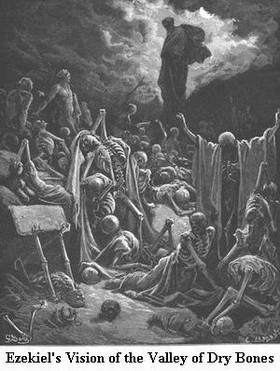|
restoring our biblical and constitutional foundations
|
Resurrecting Dry-Bone Saints
This morning in my devotions I was reading Ezekiel’s famous vision of the valley of dry bones, given to him more than 2500 years ago for the Babylonian exiles. The vision aims to revive the flagging spirits of God’s elect. The bones, of course, represent the House of Israel, and their dryness the people’s loss of hope. God’s question to Ezekiel, “Can these dry bones live?” could easily be addressed to us at the beginning of the twentieth-first century. In trying to answer it, Ezekiel says these profound words: “You alone know.” Ezekiel realizes that nothing is impossible with God and that Israel’s revival depends solely on God’s sovereign grace.
In America today nothing is needed more than revival. Each day the newspapers remind us of the futility of seeking political solutions to spiritual problems. The non-believer does not know what to do, and even a believer may be puzzled and baffled in such a time as this. Any honest Christian will admit, like the apostle Paul, that he is sometimes “perplexed” (2 Corinthians 4:8). But, like Ezekiel, he is not altogether without help. His is not the desperation of this age. He may be temporarily confused and may have to wait a long time for the fog to lift, but he is in the hands of a Pilot who always reaches the destination. There is hope for dry-bone saints, for there is One alongside to help.
 One
commentator has noted that while Ezekiel emphasizes the certainty of
revival, Isaiah emphasizes the means. Addressing the same discouraged
exiles, Isaiah says: “Those who hope in the Lord will renew their
strength. They will soar on wings like eagles; they will run and not grow
weary, they will walk and not be faint” (40:31). By faith in God’s Word,
the saint is transferred from the valley of dry bones to the land that
flows with milk and honey because God is uniquely present there.
One
commentator has noted that while Ezekiel emphasizes the certainty of
revival, Isaiah emphasizes the means. Addressing the same discouraged
exiles, Isaiah says: “Those who hope in the Lord will renew their
strength. They will soar on wings like eagles; they will run and not grow
weary, they will walk and not be faint” (40:31). By faith in God’s Word,
the saint is transferred from the valley of dry bones to the land that
flows with milk and honey because God is uniquely present there.
Tragically, Ezekiel and his generation died before they saw the elect arise from their graves and become full of the Spirit in order to return to the Holy Land. But the next generation did experience it, and they knew that the Lord had done what had seemed impossible.
No man today can put out the sign “This way out!” But there remains His way out. And it begins—and ends—on our knees. Revival is not the top blowing off but the bottom dropping out, until we have cast ourselves solely upon the mercy and grace of God. When we rely on our own strength and not on the strength of God, we fail. When we believe more in democracy than in the work of the Holy Spirit, we fail. When we seek to walk in the footsteps of great human leaders rather than in the footsteps of Christ, we fail.
The Scots Confession puts it this way:
Our faith and its assurance do not proceed from flesh and blood, that is to say, from natural powers within us, but are the inspiration of the Holy Ghost…, who sanctifies us, and brings us into all truth by His own working, without whom we should remain forever enemies to God and ignorant of His son, Christ Jesus. For by nature we are so dead, blind, and perverse, that neither can we feel when we are pricked, see the light when it shines, nor assent to the will of God when it is revealed, unless the Spirit of the Lord Jesus quickens that which is dead, removes the darkness from our minds, and bow our stubborn hearts to the obedience of His blessed will.
So, even as we work for a return to limited constitutional government, let us not forget the Source of Life, the only One who can quench our thirst. There are broken cisterns aplenty in this world, but only He can satisfy. Let us drink deeply so that we may overflow to the glory of God and the blessing of others.
June 18, 2003
David Alan Black is the editor of www.daveblackonline.com.